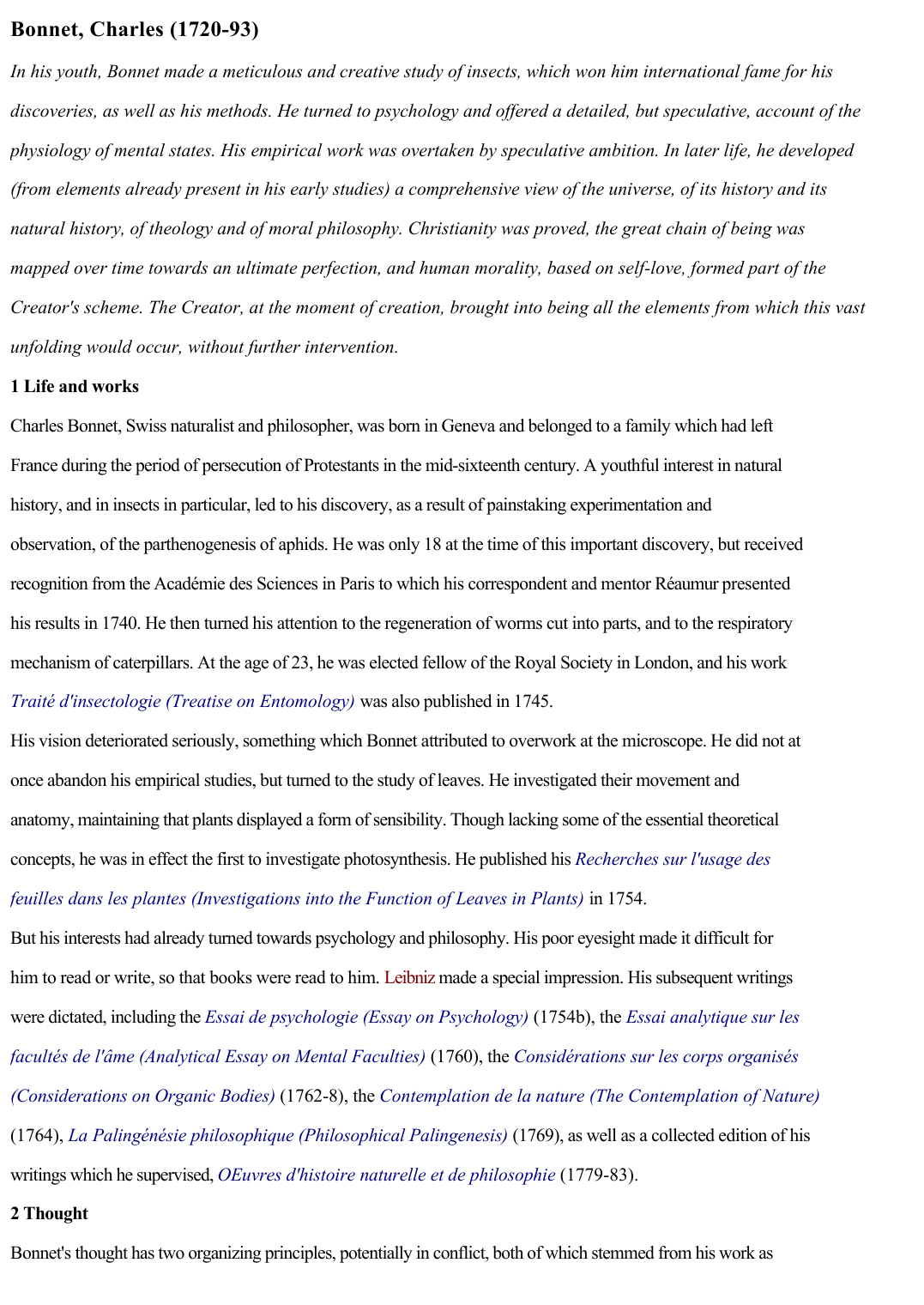Bonnet, Charles
Publié le 16/05/2020

Extrait du document
«
Bonnet, Charles (1720-93)
In his youth, Bonnet made a meticulous and creative study of insects, which won him international fame for his
discoveries, as well as his methods.
He turned to psychology and offered a detailed, but speculative, account of the
physiology of mental states.
His empirical work was overtaken by speculative ambition.
In later life, he developed
(from elements already present in his early studies) a comprehensive view of the universe, of its history and its
natural history, of theology and of moral philosophy.
Christianity was proved, the great chain of being was
mapped over time towards an ultimate perfection, and human morality, based on self-love, formed part of the
Creator's scheme.
The Creator, at the moment of creation, brought into being all the elements from which this vast
unfolding would occur, without further intervention.
1 Life and works
Charles Bonnet, Swiss naturalist and philosopher, was born in Geneva and belonged to a family which had left
France during the period of persecution of Protestants in the mid-sixteenth century.
A youthful interest in natural
history, and in insects in particular, led to his discovery, as a result of painstaking experimentation and
observation, of the parthenogenesis of aphids.
He was only 18 at the time of this important discovery, but received
recognition from the Académie des Sciences in Paris to which his correspondent and mentor Réaumur presented
his results in 1740.
He then turned his attention to the regeneration of worms cut into parts, and to the respiratory
mechanism of caterpillars.
At the age of 23, he was elected fellow of the Royal Society in London, and his work
Traité d'insectologie (Treatise on Entomology) was also published in 1745.
His vision deteriorated seriously, something which Bonnet attributed to overwork at the microscope.
He did not at
once abandon his empirical studies, but turned to the study of leaves.
He investigated their movement and
anatomy, maintaining that plants displayed a form of sensibility.
Though lacking some of the essential theoretical
concepts, he was in effect the first to investigate photosynthesis.
He published his Recherches sur l'usage des
feuilles dans les plantes (Investigations into the Function of Leaves in Plants) in 1754.
But his interests had already turned towards psychology and philosophy.
His poor eyesight made it difficult for
him to read or write, so that books were read to him.
Leibniz made a special impression.
His subsequent writings
were dictated, including the Essai de psychologie (Essay on Psychology) (1754b), the Essai analytique sur les
facultés de l'âme (Analytical Essay on Mental Faculties) (1760), the Considérations sur les corps organisés
(Considerations on Organic Bodies) (1762-8), the Contemplation de la nature (The Contemplation of Nature)
(1764), La Palingénésie philosophique (Philosophical Palingenesis) (1769), as well as a collected edition of his
writings which he supervised, OEuvres d'histoire naturelle et de philosophie (1779-83).
2 Thought
Bonnet's thought has two organizing principles, potentially in conflict, both of which stemmed from his work as.
»
↓↓↓ APERÇU DU DOCUMENT ↓↓↓
Liens utiles
- Pour devenir papillons, quelques espèces de chrysalides doivent perdre par la transpiration insensible environ la dix-huitième partie de leur poids. Charles Bonnet, Considérations sur les corps organisés
- Charles Bonnet
- Histoire de Charles Ier (extrait)L'exécution de Charles IerFrançois GuizotLe plus profond silence régnait ; il mit sur sa tête un bonnet de soie, et s'adressant àl'exécuteur : " Mes cheveux vous gênent-ils ?
- Si le rût a ses tems marqués, l'accouchement a aussi les siens. ? Charles Bonnet, Considérations sur les corps organisés, vol. 2
- Biographie de BONNET (Charles).


